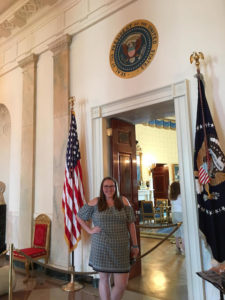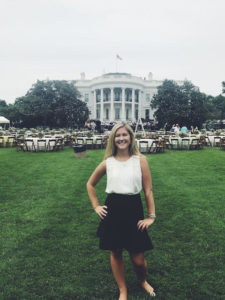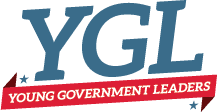It’s a tough time to be a young public servant, but there’s good news too if you look for it. The one constant in the world is change. Millennials are no longer at the bottom of the ladder, so it’s time to start thinking about the young people interested in being the public servants of the future. What drives them? How are they choosing their path? Most importantly, what can those of us already in the government do to help them?
This is a question YGL will keep coming back to, but for now, we spoke to a pair of recent White House interns to find some answers. After all they’ve seen the workings of the Federal government from a unique place. Their experiences fueled a passion for public service that continues to drive them as they get ready to graduate college in the coming years.
Our two interviewees were Emily and Ljubica; who both interned in the White House Management Office. Both began their exploration of public service with an internship in the Senate. Emily also spent a semester abroad in London working with the British Parliament. Ljubica’s work was focused on the day-to-day logistics of the White House, while Emily worked with the finance team, to her initial chagrin. “I started out worried that I had no background in finance,” Emily explained, “I’m so happy I was placed there because I learned such an incredible amount.” Both interns learned how important support functions can be in the government and how they touch and enable all the valuable work that public servants do.

Their initial interest in government was sparked by some of the same things that motivate public servants of all ages. It’s necessary work that allows someone, even someone young, to give back to their community. Of course, that doesn’t mean they didn’t have their own special motivations. Ljubica recalls that as a child, “when other girls were drawing pictures of themselves as ballerinas and princesses, I drew myself as a female President.” Their experiences have only whetted their appetites to serve. Both of them reported that they plan to apply to federal and state government jobs when they graduate. Ljubica said that nothing compares to making a difference in the lives of everyday people: “That’s exciting, and hard, but rewarding as well.”
The brief time they spent inside the government changed their perspectives as citizens. Emily said that she thinks differently about the news and government now. She is also a little more skeptical about how the media covers the way the government functions. Ljubica was impressed by the work ethic she encountered, saying “a lot of people from the outside think the government is a 9 – 5 job, but inside, you see everyone putting in 110% every day.” She was also surprised and inspired, by how young some of the full-time staff was. She assumed that everyone would be in their 40s and 50s, but instead she realized that “in 4-5 years, I could be working for the Senate or for an agency in the government.”
Both interns found that their friends and family were curious about their experiences. As a result, they eagerly shared what they learned – how government works from the inside and all the sweat people put in behind the scenes – within their inner circles. They also provided good advice for younger students beginning to consider a public service career. Some of them were:
- Don’t be afraid to ask questions. As Emily put, “24/7, keep your ears open wide.”
- Don’t hesitate to tell people what you want and where you want to go. Reach out to older students and friends to get the information you’ll need to try out that path.
- Try an internship or other type of experience outside of class because you may end up loving it. Ljubica said, “It can really embolden you in your career path to see what a difference you can make.”
- Learn how to network. Go to coffee with people and learn about them because it helps you learn what you need to plan your own career. Usually people say yes and if you wait, that opportunity will pass.
- One advantage of internships is a chance to learn, practice and apply important skills that will be useful throughout your career. Start learning how to write professionally in an office setting.
- It may sound elementary, but listening skills are essential. Conversing and receiving instructions from colleagues is non-stop. People who are used to communicating over text or email need to especially focus on verbal communication so they can work well with older colleagues.
So what can Millennials already in the government do to help individuals like Emily and Ljubica who are just starting their government careers? First, we can connect young people together and help build a community where information sharing is the norm. Second, encourage them to participate in mentorship programs. Mentors can provide guidance as to which career path to follow. They can also share some of the lessons they learned along the way. And third, they can help younger public servants stay motivated throughout their career. Who else understands the unique challenges they face, even after someone’s first job in the government?
 Emily and Ljubica are both optimistic about the future of public service. Both can attest that the younger generation is invested in finding ways to make the government more efficient using technologies they’ve grown up with. Ljubica said that she believes 100% that the generation of public servants who will graduate college in the next five years will make a huge difference. Their different way of looking at things may relieve some of the present tensions we see in the government by bringing a different perspective and introducing innovative tools to bear on these problems. She sees optimism, saying, “Our generation may be naive, but there is also a chance to make a big difference if we work together.”
Emily and Ljubica are both optimistic about the future of public service. Both can attest that the younger generation is invested in finding ways to make the government more efficient using technologies they’ve grown up with. Ljubica said that she believes 100% that the generation of public servants who will graduate college in the next five years will make a huge difference. Their different way of looking at things may relieve some of the present tensions we see in the government by bringing a different perspective and introducing innovative tools to bear on these problems. She sees optimism, saying, “Our generation may be naive, but there is also a chance to make a big difference if we work together.”
Emily said that she expected challenges and realized that she may not be able to make a difference right away, but she also saw eagerness in her generation. They’re part of a rising cadre of students in high school and college that are thinking about careers in public service. However, in order to be successful and reach their full potential, they will need our help and guidance. They need the assistance of young professionals already in government to help them find their way. This is the chance for older Millennials to become mentors and continue to transform the government in their own image. So ask yourself what you can do, on your own or as part of a group, to help younger public servants and to share your hard-won lessons with your future colleagues. “We’re ready to hit the ground running,” says Emily. Will you be there cheering them on?
This article was written by Joseph Maltby, YGL Director of Research & Advocacy.

